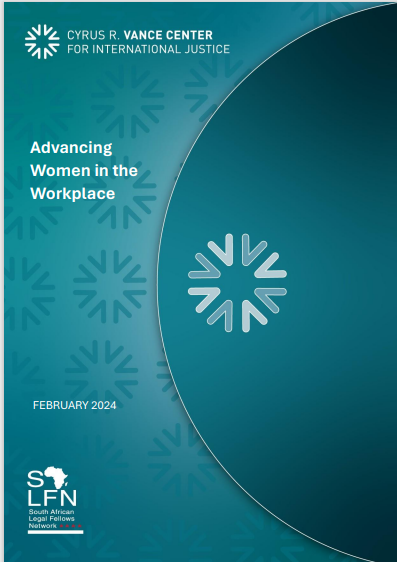AWW Legal Forum Celebrates Mentorship Program, Launches Groundbreaking Survey and South African WIP Chapter
March 2024The Advancing Women in the Workplace Legal Forum celebrated two successful years of the AWW mentorship program, unveiled the results of a survey analyzing barriers and challenges for Black women in the legal profession and announced the creation of the South African chapter of the Women in the Profession program.
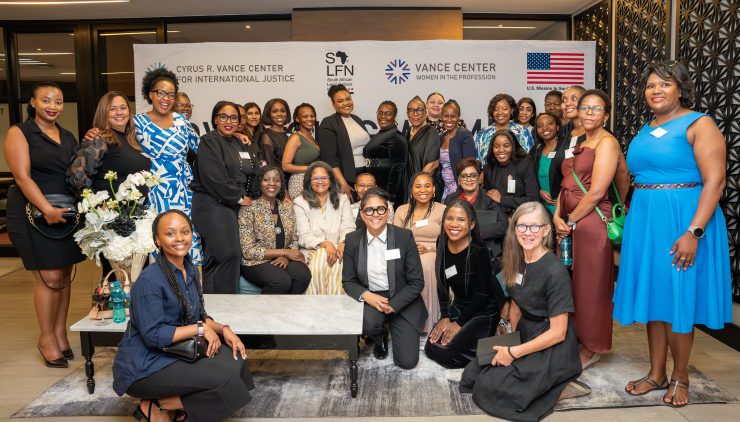
AWW mentors, mentees, organizers and supporters at the AWW Legal Forum in Johannesburg, South Africa, March 1, 2024. Photo credit: Gabriel Thomas/SP Events and Tech
On March 1, the Vance Center and its South African Legal Fellows Network, through its Advancing Women in the Workplace (AWW) program, in collaboration with the United States Mission to South Africa, hosted an afternoon full of celebration and firsts.
Dozens of mentors, mentees, law firm partners, judges, academics, and other supporters gathered at the Sandton offices of law firm Baker McKenzie for the Advancing Women in the Workplace Legal Forum, which featured a presentation of the first-of-its-kind survey, a panel discussion of the findings, and the launch of the AWW-Women in the Profession program in South Africa.
The AWW program, established in 2022 with the goal of supporting young Black women practitioners to advance to leadership positions in the South African legal profession, is moving into its next phase. Beyond programmatic offerings of training sessions and fireside chats, the program sought to delve deep into workplace dynamics, shedding light on challenges faced by Black women in legal professions and their path toward leadership roles.
The evening’s festivities began with moving opening remarks by U.S. Ambassador to South Africa Reuben E. Brigety II, PhD. In his comments, Ambassador Brigety emphasized courage as an essential quality to confront and overcome challenges.
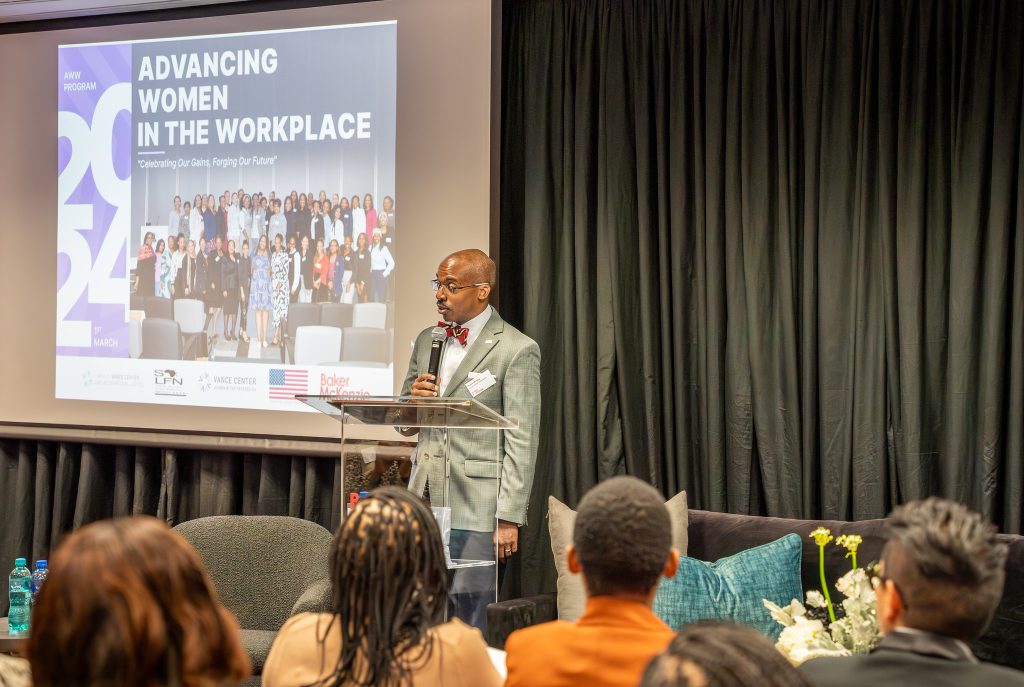
U.S. Ambassador to South Africa Reuben E. Brigety II, PhD, offers opening remarks at the AWW Legal Forum, March 1, 2024. Photo credit: Gabriel Thomas/SP Events and Tech
Ambassador Brigety’s welcome was followed by a powerful keynote address from Judge Navanethem Pillay, who was greeted with a standing ovation from attendees. A trailblazing legal pioneer, she was the first woman to start a law practice in her home province of Natal in 1967, and the first non-white woman judge to serve on the High Court of South Africa. Judge Pillay’s career spans appointments to the International Criminal Court, presidency of the International Criminal Tribunal for Rwanda, and tenure as the United Nations High Commissioner for Human Rights (2008-2014).
In her address, Judge Pillay recounted her professional and personal journey, underscoring the pervasive difficulties women encounter within all different spheres of the legal profession, and emphasizing that collective determination and a shared purpose can enable triumph over any obstacle.
With the echo of Judge Pillay’s stirring words still ringing through the room, Vance Center Africa Program Director Adaobi Egboka and AWW consultant Dr. Kim Lamont-Mbawuli unveiled the results of the AWW Survey. Recognizing the need for comprehensive data to drive meaningful change, the Vance Center, in partnership with the South African Legal Fellows Network (SAFLN) and the U.S. Mission to South Africa, spearheaded the implementation and publication of this survey analyzing barriers and challenges for Black women in South African law.
Dr. Lamont-Mbawuli highlighted some of the survey’s key findings. She noted that the findings should serve as a catalyst for introspection and action, sparking a collective determination to chart a path forward for South African women in law. See below for more details on the survey findings, and read the full survey here.
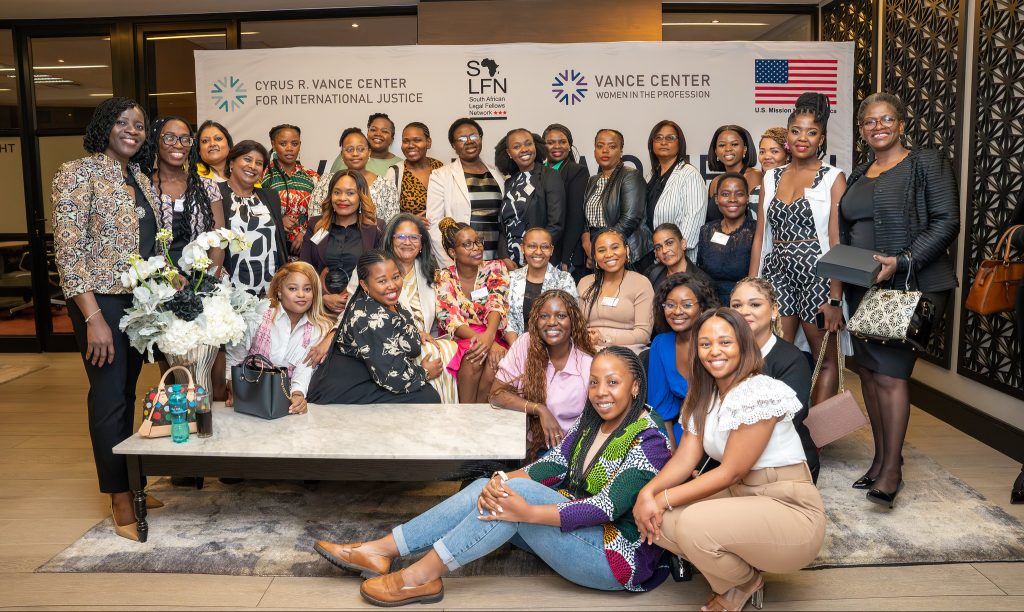
AWW mentors, mentees, organizers and supporters at the AWW Legal Forum in Johannesburg, South Africa, March 1, 2024. Photo credit: Gabriel Thomas/SP Events and Tech.
The evening’s panel discussion to discuss the survey findings featured insight from an expert group: Lerisha Naidu, Managing Partner at Baker McKenzie; Pavel Matthews, Principal Legal Counsel at Absa Group; Belinda Mapongwana, founder of Mapongwana Attorneys; and Senior Counsel Adv. Anthea Platt, who engaged in a thought-provoking dialogue moderated by Adv. Jabu Thobela-Mkhulisi. The panelists delved into pressing issues ranging from unconscious bias and confronting stereotypes to the pervasive challenges surrounding briefing patterns and sexual harassment within the legal profession.
With insights gleaned from real-world experience and empirical research alike, the panelists discussed effective approaches to fostering inclusivity and tangible change and underscored the critical importance of confronting systemic barriers and championing diversity at every level in the legal field. Even as the conversation drew to a close, it was clear that the journey towards equitable representation and inclusion remains ongoing—a journey fuelled by collaboration, advocacy, and unwavering resolve, as the evening’s speakers repeatedly reminded the audience.
“Use your voice, even if it shakes,” Naidu encouraged the attendees.
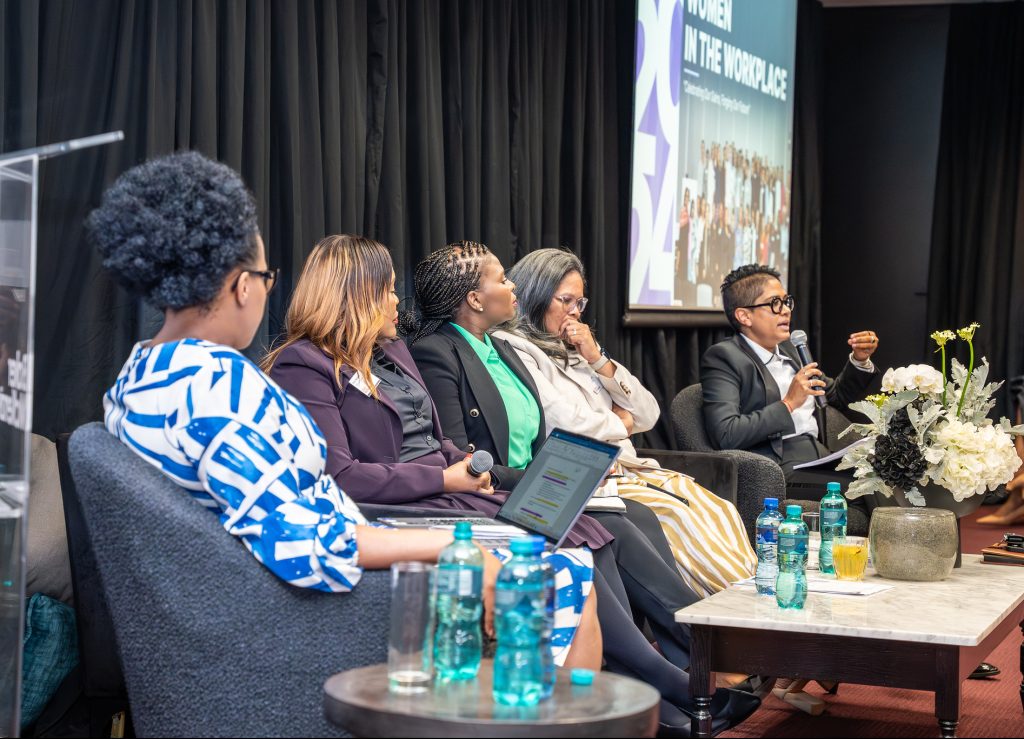
Panelists at the AWW Legal Forum, March 1, 2024. Photo credit: Gabriel Thomas/SP Events and Tech
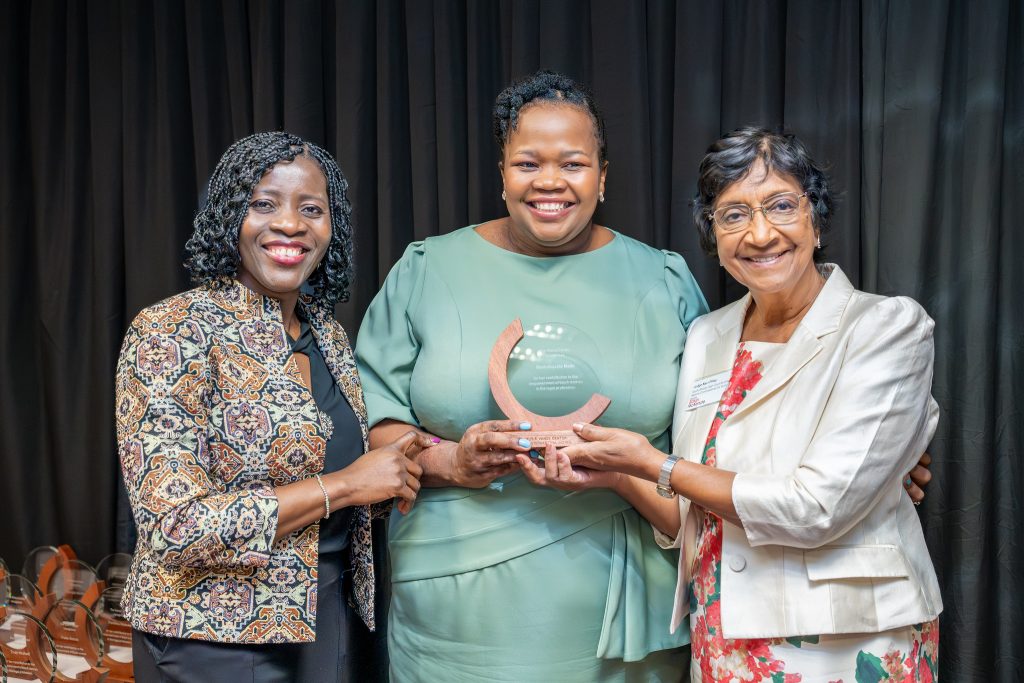
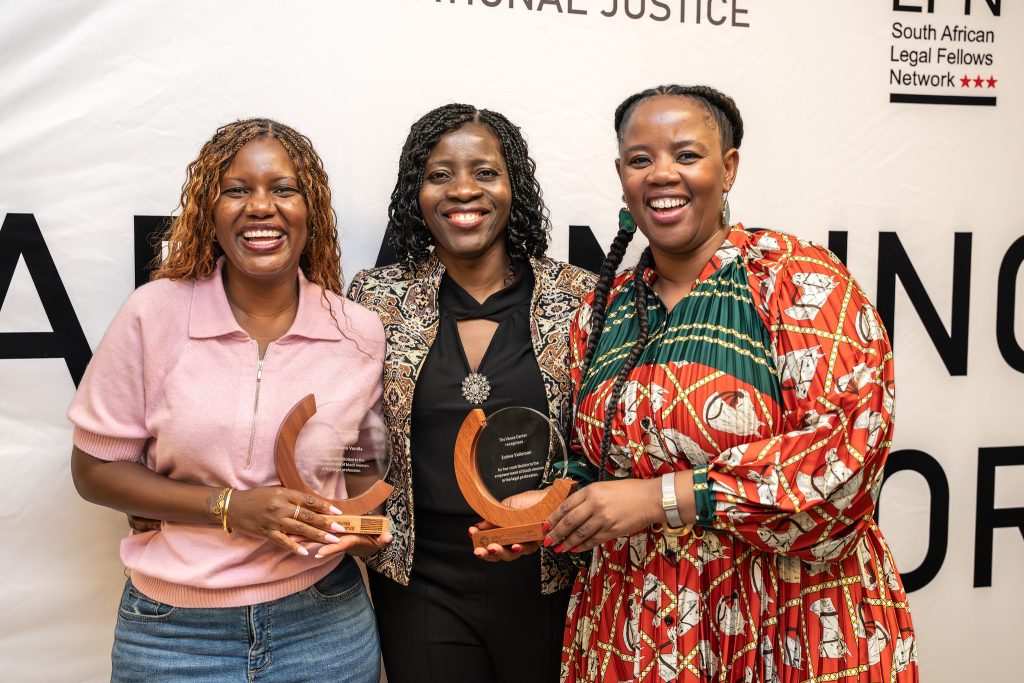
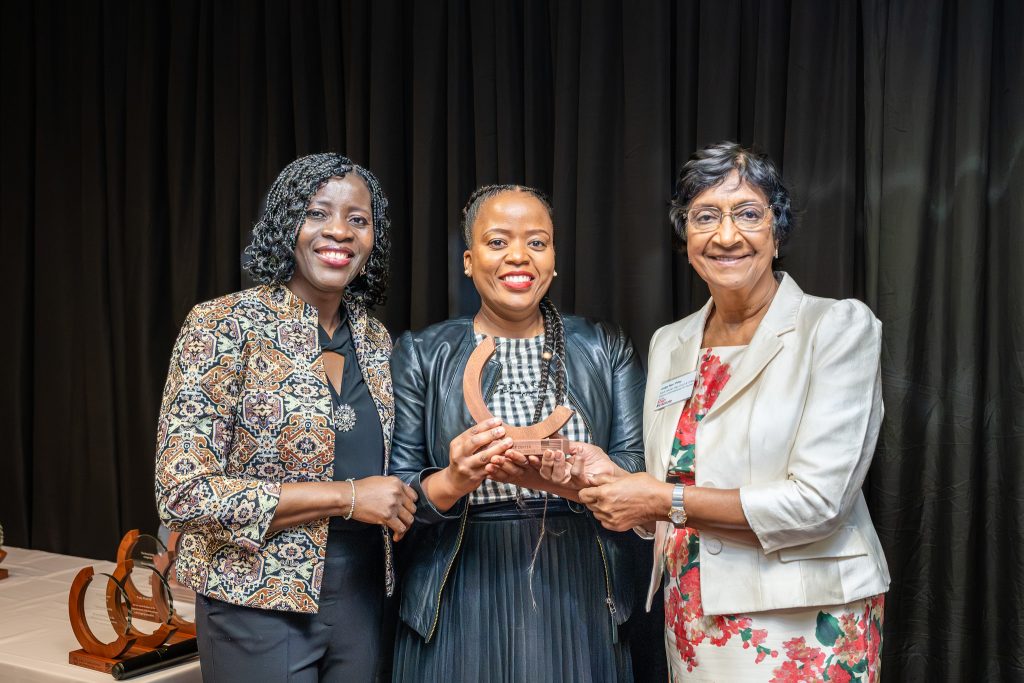
The Vance Center’s Adaobi Egboka and keynote speaker Judge Navi Pillay presented mentors and support committee members (from top) Nontuthuzelo Made, Lindi Atieno Vundla, Zodwa Velleman, and Rorisang Mzozoyana with plaques at the AWW Legal Forum, March 1, 2024. Photo credit: Gabriel Thomas/SP Events and Tech
The evening also offered an opportunity to celebrate and showcase the bonds formed between and among mentors and mentees over the course of the AWW program, and thank mentors for their commitment to the program’s success. Judge Pillay and the Vance Center’s Egboka presented mentors and members of the mentor support committee with plaques in recognition of their time, expertise, guidance, and invaluable contributions to guiding and supporting AWW mentees along their professional journeys.
“Their selfless investment of time and expertise ensured that mentees were equipped with the tools and guidance necessary to navigate the complexities of the legal profession, fostering enduring growth and development,” noted Dr. Lamont-Mbawuli
As the room brimmed with applause and appreciation for the mentors, video testimonials from participants offered moving reminders of AWW’s transformative impact. Mentees from all walks of life shared heartfelt anecdotes, underscoring the profound influence of the mentorship on their personal and professional trajectories, from navigating challenging cases to overcoming systemic barriers with courage and conviction. The powerful stories and joyful atmosphere within the room made clear that the bonds formed through mentorship go beyond just professional guidance—they embody a shared commitment to excellence, resilience, and solidarity, fostering a supportive, empowering community whose ripple effects extend throughout and beyond the legal profession.
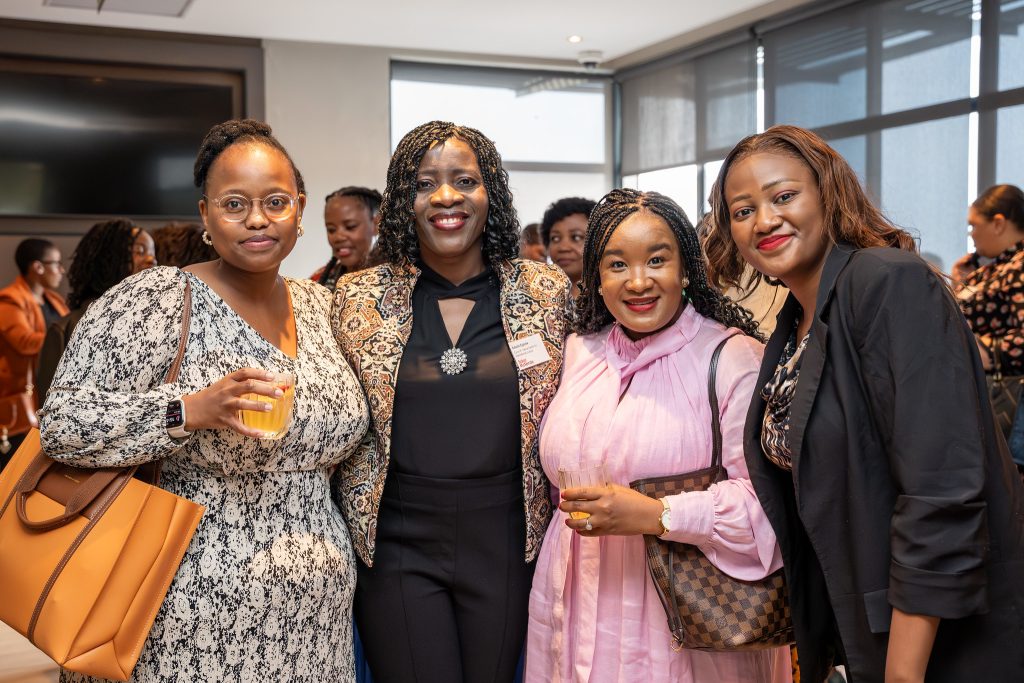
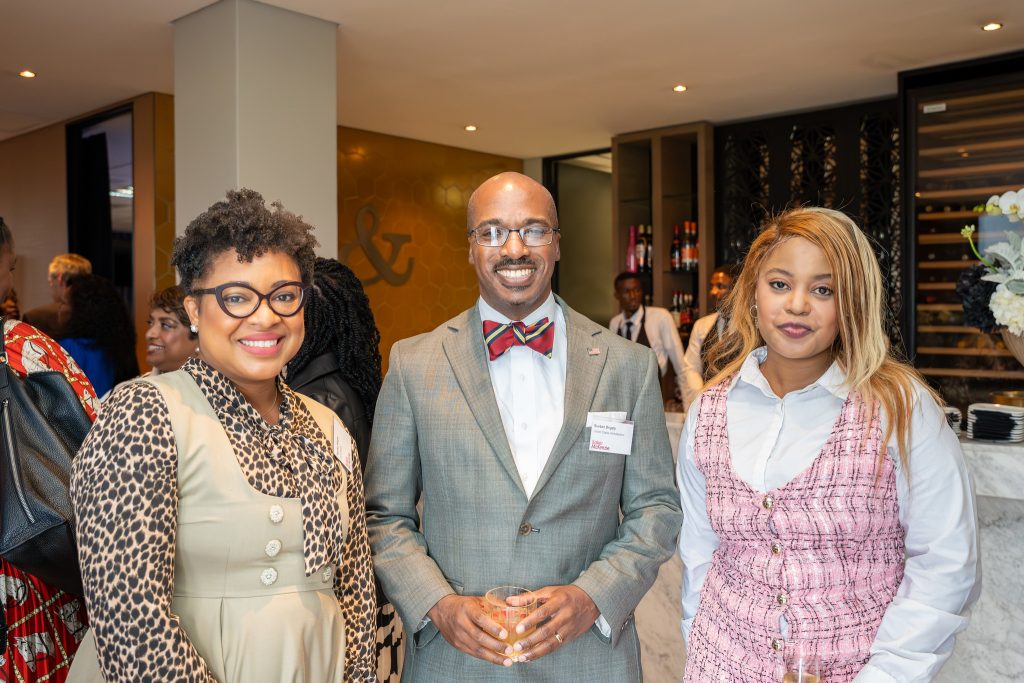
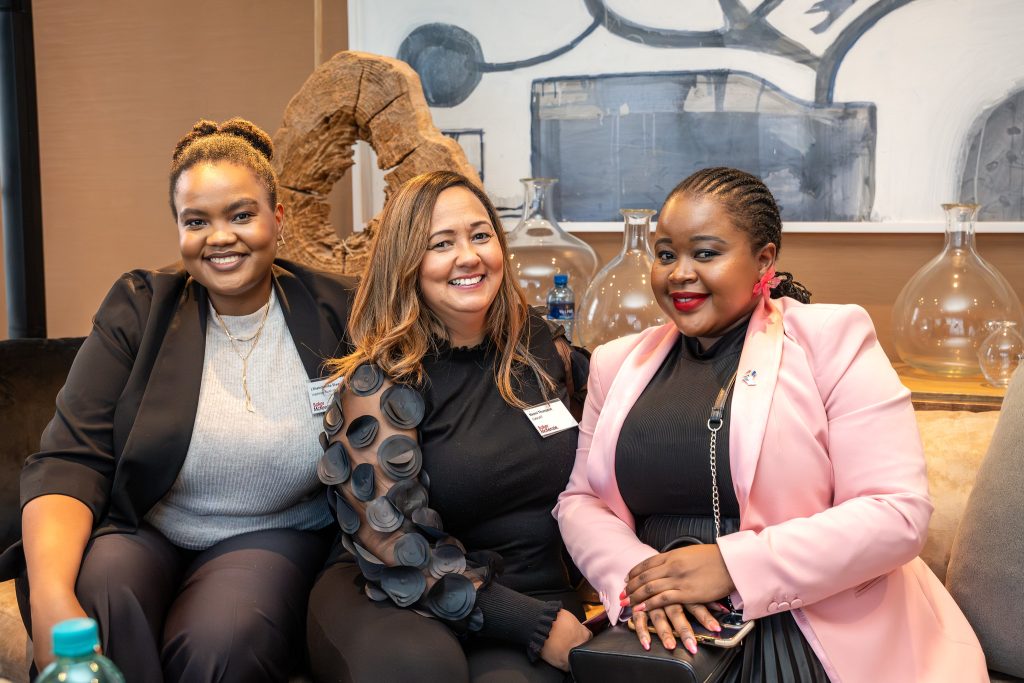
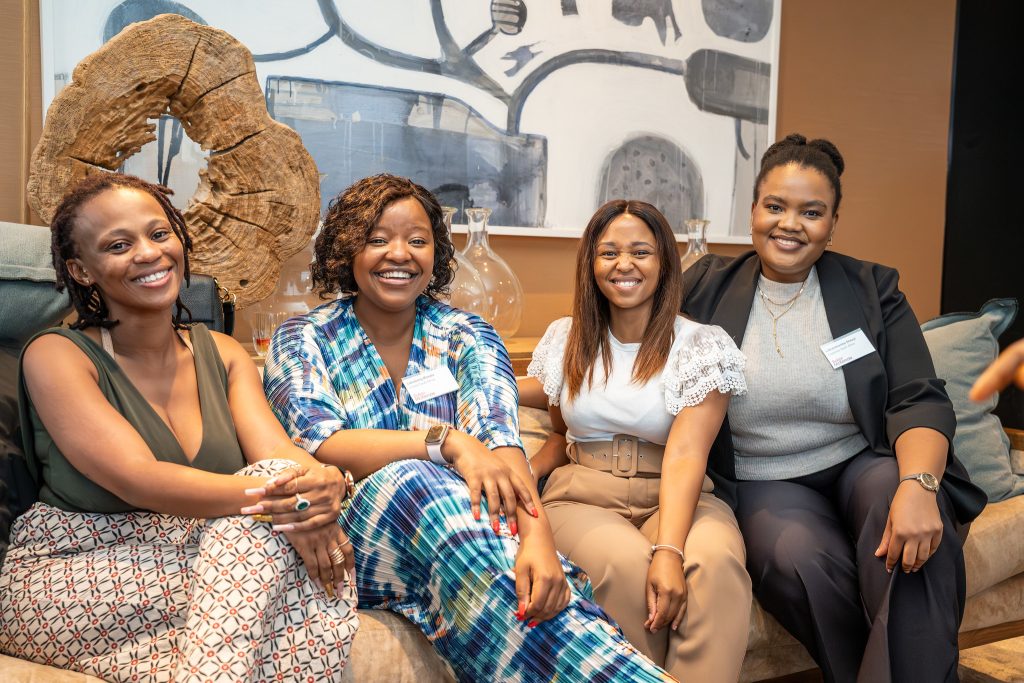
AWW mentors, mentees, organizers and supporters celebrating at the AWW Legal Forum in Johannesburg, South Africa, March 1, 2024. Photo credit: Gabriel Thomas/SP Events and Tech
Finally, attention turned to the future. Spearheaded by SAFLN alumna Zodwa Velleman and fuelled by a vibrant network of women legal practitioners, the AWW mentorship program will continue supporting mentorship and women’s leadership in the legal profession.
Adaobi Egboka announced the new steering committee members for several province-level subchapters that will make up AWW-Women in the Profession (WIP) South Africa. With this debut, South Africa becomes the newest chapter in the Vance Center’s international Women in the Profession network, which has 23 chapters across Latin America and sub-Saharan Africa.
These leaders, drawn from diverse backgrounds and experiences, will lead the next iteration of these efforts to support women’s leadership and achievement. The new AWW-WIP SA chapter will play a critical role in future projects to mobilize legal practitioners across South African provinces to advance racial equity and inclusion at the professional and community levels.
See more photos from the evening here.
*********
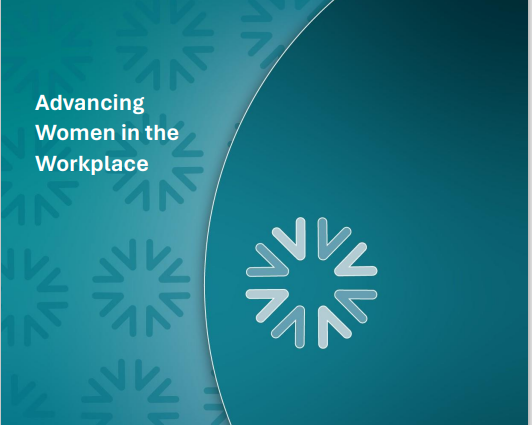
AWW Survey
The Advancing Women in the Workplace survey, presented during the March 1 event, revealing critical insights into pervasive issues of racial and gender-based discrimination within legal workplaces, and the impact of those biases on women legal professionals.
Although more women than ever are entering the legal profession, they are not rising to leadership positions at the same rate as their male colleagues; the disparity is even greater for women of color in comparison to their white and male counterparts.
The overall share of practicing female and Black attorneys in South Africa increased from 2013 to 2022, but the survey found persistent disparities in representation of women—particularly Black women—in both attorneys’ and advocates’ professions, with the share of women decreasing in more senior positions.
From disparities in briefing patterns to the insidious effects of gender and race-based biases, the survey painted a stark reality. More than two-thirds of respondents (68%) recounted instances of discrimination, while 50% reported incidents of bullying and 31% reported experiencing sexual harassment. More than 70% of the women surveyed agreed that patriarchal and sexist norms are still prevalent within the profession.
Respondents identified a number of contributing factors, including pre-existing male-dominated social networks based on established relationships; clients and colleagues questioning the intelligence, talent, and experience of female practitioners; unequal distribution of work for female practitioners; a lack of face time for female practitioners as a result of them remaining primary child caregivers in society; maternity leave and inflexible policies as an obstacle to achieving target billable hours; a referral system that favors men; and persistent gender stereotypes and gender bias in the legal profession.
Despite a number of laws aimed at promoting gender equality, including the Legal Practice Act 28 of 2014, the reality of South Africa’s legal profession does not reflect this framework. The analysis notes that policymakers and leaders in the legal field must take more positive systemic action to address ongoing gender-related exclusion, marginalization, and discrimination within the profession.
Even against this disheartening backdrop, it is clear that South Africa’s Black women lawyers remain committed to their work, with 62% of Black women affirmed their unwavering commitment to their chosen career paths.
“These results remind us that South Africa’s legal profession is filled with talented, ambitious, and accomplished women, but that there are still significant barriers preventing these women, especially Black women, from advancing to leadership and reaching the full scope of their talent and potential. Still, we see that women lawyers are building their own pathways to a brighter, more inclusive future, establishing their own firms and mentoring younger professionals through programs like Advancing Women in the Workplace,” said Vance Center Africa Program Director Adaobi Egboka.
The survey, conducted by Plus94 Research, analyzed responses from 100 senior female legal practitioners working in different areas of the legal profession.


